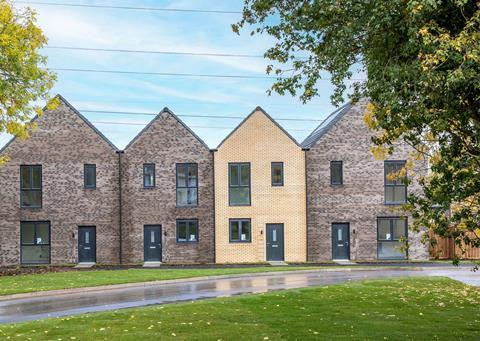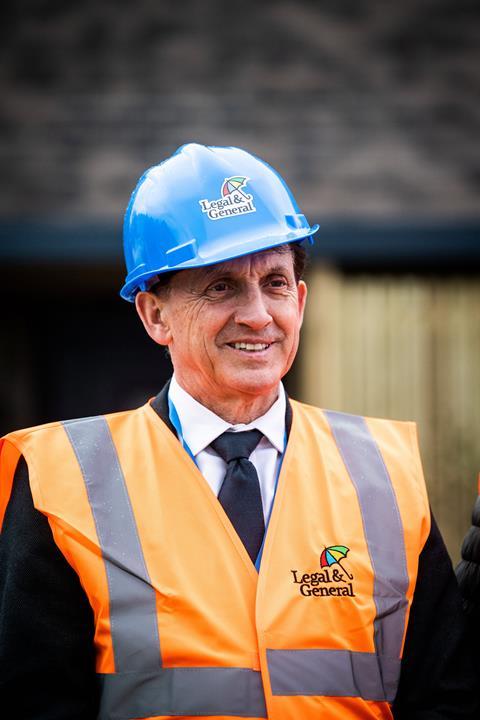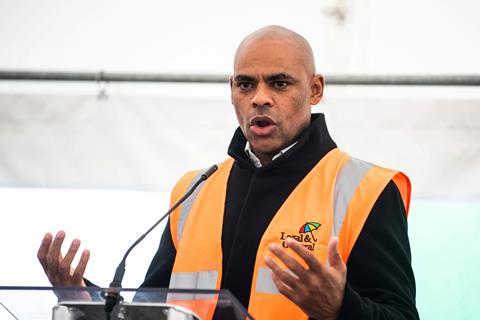L&G’s chief tells Joey Gardiner why not all of its investments have worked out so far – and why he remains optimistic that they will
“No comment,” says Nigel Wilson, with a broad chuckle and a wry grin which indicates that my question has hit a mark. I have just asked the long-time chief executive of insurance giant L&G if he was pleased that he turned down the ministerial job he was, by all accounts, offered by Liz Truss in September.
Despite his silence, one cannot but help feeling that the decision to refuse Truss’s offer reflects well on his judgment – and I suspect he knows this.
Either way, if the media-friendly Wilson – Sir Nigel, to give him his full title – is uncharacteristically unwilling to discuss his decision, it is certainly little surprise that he is being sought after at the highest levels. Since taking the L&G top job in 2012, Wilson has impressed both the City – through consistent financial performance – and policymakers with his vision of “inclusive capitalism”, his claim of putting social purpose at the heart of his multi-billion pound business.

His strategy to deliver this vision has been, on one level, simple: to take the billions in pension liabilities that L&G looks after (actually a staggering £1.3 trillion at the latest count) and, rather than engage in complex financial engineering, look instead for real physical assets to invest in which both deliver socially and generate long-term stable returns.
In few areas has this strategy and this vision played out more obviously than in L&G’s headlong plunge into residential development, where it has a plan to build 10,000 homes per year – which would make it the UK’s fourth biggest housebuilder. But L&G’s investment has not been plain sailing.
While its traditional housebuilding activities have progressed well, the more innovative activities have struggled through choppy waters. The modular business it set up six years ago has racked up more than £170m in losses and is yet to turn a profit, while its flagship later living business, Inspired Villages, is also loss-making. I meet Wilson at the launch of a major modular scheme – Bonnington Walk, in Bristol – to ask him what has made it all so hard, and whether his patience with the sector is limitless.
Unconventional
An unconventional FTSE 100 chief executive, this former council estate boy from County Durham is a capitalist who reportedly claims welfare state founder William Beveridge as his hero and has Karl Marx sitting on his bookshelf. And, with the UK gripped by a housing crisis, the residential development sector unsurprisingly meets all of Wilson’s requirements for “inclusive capitalism” – real physical assets, that can meet an urgent social need, and that can deliver a solid financial return for L&G’s many pension holders.
“The world still is full of lots of money,” he says, “though it’s a bit more expensive than it used to be. But it needs recycling in a way that makes a difference in people’s lives.”
”I got to move into a new council house– and that really created a platform for the rest of my life. I would never have been here today if I had continued to live […] in a massively overcrowded house”
Sir Nigel Wilson
It is a message which clearly resonates with L&G’s public sector customers, such as Bristol’s Labour mayor Marvin Rees, and maybe makes its £2.2bn in annual pre-tax profit easier to justify. Speaking at the same event, Rees said: “I really value some of the public commentary that we have from L&G about the nature of the economy and capitalism, and how we make sure values are stitched into the way the economy works. Having that commentary is incredibly valuable to all of us.”
But the housing push seems more than just fitting the inclusive capitalism mould. A one-time director at commercial developer Stanhope, Wilson also clearly has an affinity with the development trade – one of his catchphrases is that cities “aren’t overbuilt, they’re under-demolished”.
>> See also L&G Modular: the potential to transform housing delivery
>> See also L&G pledges £4bn investment in west Midlands
But there’s clearly personal history with housing too. He says: “When I grew up, I grew up in Newton Aycliffe, which was a new town. I got to move into a new council house, [into] a two-bedroom house, very different at the time – we were just so excited about it.
“I went to the local new school, with new teachers, new everything – and that really created a platform for the rest of my life. And that created an opportunity, and I would never have been here today if I had continued to live with my grandparents in a massively overcrowded house.
“We want people to have those opportunities today.”
Since taking the top job, Wilson has overseen a dizzying array of investments in the housing sector. Through the group’s “alternative asset” business, Legal and General Capital, it owns 3,000-homes-a-year traditional housebuilder Cala, an urban build-to-rent development business, a suburban build-to-rent business, a for-profit affordable homes provider, two later living businesses, Inspired Villages and Guild Living, and its modular housebuilding business, L&G Modular.
And this is not to mention the array of wider development deals with universities and city mayors – such as a £4bn regeneration and housing deal with West Midlands Combined Authority boss Andy Street, or the similarly-sized joint venture with Oxford University.
Housebuilding revolution
In its latest results statement, L&G said that its ambition was that it will build 10,000 “multi-tenure” homes per year, made up of 3,000 homes for sale, 3,000 affordable homes and 3,000 homes through the modular business, with 1,000 through the suburban rental business. In addition, it claims a 5,000-home pipeline in both its urban build-to-rent and later-living businesses.

At the Bonnington Walk launch, Wilson spoke about wanting to spark a “housebuilding revolution” through modular construction. But, despite all this, he actually rejects the idea that L&G is particularly obsessed with residential development, or has made a particularly large investment in the sector – rather this size of investment just reflects the scale of L&G overall.
“Everything is large,” he exclaims, referring to the group’s investments in other sectors. “We are particularly big in solar, in offshore wind. We have 500 start-ups we are financing across the group. When people come and give a sectoral analysis, they always say ‘you’re big in this’. Well we’re actually really big in all of these things now.
“In part it’s because there aren’t bigger companies in Britain. That is, I think, one of the one of the issues – that everybody [in the UK] needs to get a lot bigger and more successful.”
While Cala has grown rapidly under L&G’s stewardship – and L&G’s for-profit affordable homes provider appears to be making rapid progress – some of its other residential businesses have found life more difficult, with the modular business suffering another £37m loss last year despite finally reporting its first ever turnover.
Overnight sensations
Much has been written about its travails, but Wilson insists that reporting of the firm’s £174m of cumulative losses since 2016 is wrongheaded – if it was the life sciences sector, he points out, journalists would describe it as £170m of R&D investment. “People forget that places like Tesla – it was started in 2003. All these things that are overnight sensations are not. They take forever to get going. The economics are not compelling [at first].”
“When you are trying to start up new business models in a country that has just got slow planning, it is very, very hard. And that’s the big challenge. How do you get to critical mass?”
Sir Nigel Wilson
But he admits that “it’s not easy”, even if customers such as Bristol city council appear delighted with the product on display at the launch. So why has it been so hard? “The challenge is the speed of planning in the UK,” Wilson says, “and the interaction between planning and manufacturing isn’t great.
“You know, we have a timetable. And then the timetable inevitably gets delayed for years and years. And that’s the challenge.
“America has a very rigid system. You just go through it, and it delivers predictable outcomes. [But] the UK has a terribly unpredictable system, which doesn’t always deliver good outcomes.”

He says these general issues with planning are made worse by the fact that the modular business is trying to do something innovative, so “people want to understand it a little bit better”, and because, as a start-up, it doesn’t have a vast swathe of sites to juggle between when projects get delayed.
“It’s different for build to sell because you have got hundreds and hundreds of sites, and you build that portfolio over a long, long period of time. You build that into your business model.
“When you are trying to start up new business models in a country that has just got slow planning, it is very, very hard. And that’s the big challenge. How do you get to critical mass?”
The problems that this causes, he says, are only going to intensify with the cost of capital now rising as the economy moves out of the low interest rate environment it has been in since the global financial crisis. “In London, [our teams say] it is [taking] seven years now on average between buying a site and putting a spade in the ground. In a high interest rate environment that is just not going to be acceptable. Planning is such an awful problem in the UK.”
‘Never down’
But, given his comments about Tesla, does L&G just continue to write off these problems as teething issues forever? Wilson is not about to say when he expects L&G Modular, which now claims a pipeline of 1,200 homes, to turn a profit – but, significantly, he rejects the notion that the firm will be allowed as long as it takes. “No, of course we’ve got shareholders as well to think about,” he says, before returning to his complaints about the planning system.
But despite these challenges, Wilson is clearly one of life’s optimists, who relishes a challenge and values people with the ability to get back up and carry on when they have been knocked down. When I point out that the later living market also appears to be a hard slog, not least because every time the government understands the policy challenges, the minister responsible changes, he says, with a broad smile on his face, “everything’s a hard slog. The world’s full of hard slogs.
I really value some of the public commentary that we have [from Nigel Wilson] about […] how we make sure values are stitched into the way the economy works. Having that commentary is incredibly valuable”
Marvin Rees, mayor of Bristol

“I don’t come in on Monday morning thinking, ‘oh I’ve got an easy week because the money’s just going to pour in, I’m going to swan around’.
“Resilience is a much under-rated personal attribute – we’re always up for the new challenge. And you have to be because, otherwise, you would just get frustrated consistently. I’m never down.”
Now, his optimism and resilience is turning to the economy – with good reason given the gloomy outlook. He is hopeful that the mortgage market will now start to calm down given the rowing back from Kwasi Kwarteng’s mini-Budget, but says that in the meantime high interest rates will bolster the rental market and thus the development of homes for rent.
And, while chaos in central government persists, he says he continues to place his faith in local government leaders such as Bristol’s Marvin Rees, Birmingham’s Andy Street and Manchester’s Andy Burnham to be the reliable partners to L&G that central government often isn’t. Time will tell if his faith is to be rewarded – and if L&G can deliver on its ambitious housebuilding dreams.



























No comments yet